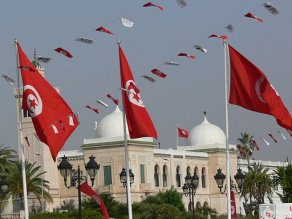Monday 21 December SPLM (IO)’s team of delegates arrived in Juba. At least one child was killed and three others injured in aerial bombardments in Khor Tumbak. Officials in Maban County, Upper Nile state, blamed the attack on the Sudanese Air Force. Tuesday 22 December South Sudan’s central bank sold US$20 million to 13 commercial… Read more »
A Drama in Several Acts
Nearly five years since Tunisia’s revolution began to spread, the hopes and expectations of democracy have been replaced by despair and fear of what will follow.
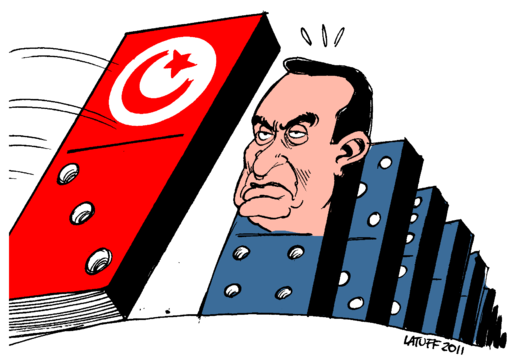
“In their despair over the current situation, some people are falling victim to the temptation to look back with nostalgia to the old regimes”. Hosni Mubarak facing the Tunisian domino effect. Carlos Latuff 2011.
This has been an important and proud autumn for Tunisia and the Tunisian people. Ever since the Chair of the Nobel Committee, Kaci Kullmann Five, announced in October that the Peace Prize had been awarded to the Tunisian National Dialogue Quartet (and once everyone had discovered via Google that the Quartet was not in fact a group of jazz musicians) the “Tunisian Model” has quite rightly received much praise and attention. Read More
This Week in South Sudan – Week 51
Monday 14 December The South Sudanese government has ordered SPLA to pursue a new rebel group in Eastern Equatoria state. This is connected to recent clashes between government forces and the rebels in Oguruny village. The so-called ‘Arrow Boys’ claimed their forces occupies several locations in Western Equatoria state, warning the government not to provoke… Read more »
Bosnia 20 Years On
The Dayton agreement ended the war. But with children from different ethnic groups unable to attend school together in many places, its intentions concerning reconciliation have unfortunately not been realized.
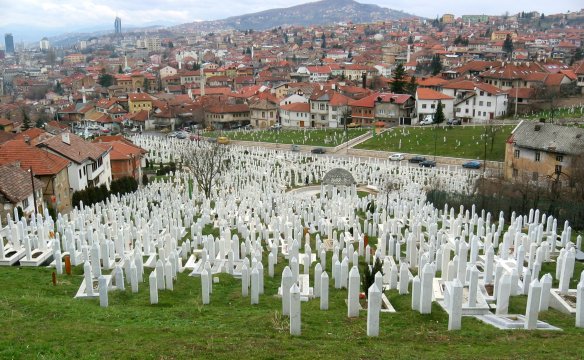
Martyrs’ memorial cemetery Kovači in Sarajevo. Photo: Michael Büker
“Of course I don’t need good grades in Bosnian when I’ve got good grades in English,” says a 13-year-old to his father in Sarajevo. The boy, who usually does well at school and has consistently good grades, has this year done slightly worse than usual in Bosnian, which is his mother tongue. His father is concerned. “But, why don’t you need good grades in Bosnian?” asks the father, with some astonishment. His son is quick to provide an explanation: “I won’t live here when I’m grown up. I’ll have to go somewhere else to find a job. For that it’s more important to know English than Bosnian.”
Read More
Myanmar: What now for Women and Minorities?
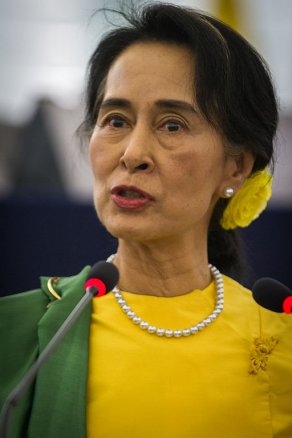
Photo: Claude Truong-Ngoc
Will Aung San Suu Kyi dare to engage in a direct confrontation with religious nationalism and insist that the new parliament reconsider Myanmar’s laws on race and religion? Doing so could cost her dearly.
Sexual violence
Myanmar (formerly known as Burma) has been in a continuous state of civil war since its foundation as a state in 1948. Different ethnic minorities have opposed the central government, because they view the state as illegitimate. The resulting wars have led to enormous suffering for women, men and children. War affects women and men differently, however. A particularly serious consequence has been the army’s use of sexualized violence against ethnic minority women. Violence against women is a widespread problem, but Burma offers little legal protection to victims either of domestic violence or of various forms of sexualized violence. In addition, women have been omitted systematically from peace negotiations between rebel groups and the state. Consequently, 52% of the country’s population is not included in the process of building political foundations for future peace.Read More
An Academic New Year’s Resolution for Colombia: Understanding Continued Gendered Violence as a Threat to Positive Peace

Photo: Neil Palmer (CIAT)
Over the last decade, Colombia has been host to the world’s largest population of internally displaced people (IDP). In 2016, it is expected that the Colombian government and FARC will reach a peace agreement, marking the formal end of more than 50 years of civil war. It is widely recognized that this peace agreement will not resolve the immediate causes of displacement, but rather generate one kind of settlement in a context of longstanding and complex uses of violence.
At present, contradictory tendencies seem to be at play: While periods of 2015 have seen the lowest levels of violence recorded on a national level since 1975, threats against civil society actors are increasing at an alarming rate.
Is it Strange that Dictators Hold Elections?
Why do dictators hold elections that merely play to the gallery?
On 11 October, Alexander Lukashenko was re-elected as president of Belarus with an impressive 84 per cent share of the vote. The election was anything but free and fair. According to the OSCE, Belarusian law makes it impossible for the will of the people to be realized and, as if that were not enough, the election itself was characterized by fraud. Lukashenko’s regime had invested significant resources in preventing the election from being meaningful. So what was the point of holding it? Why do dictators hold elections that merely play to the gallery?
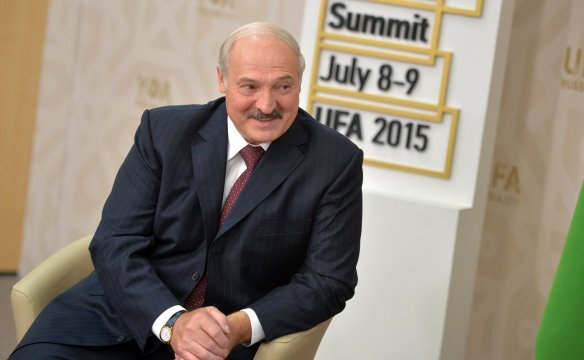
Alexander Lukashenko during this year’s 7th BRICS summit in UFA. PHOTO: CC BY 4.0
The fact that regimes like Lukashenko’s hold elections is even more surprising when one takes into account the fact that doing so is often extremely hazardous for a regime. Recent research conducted by myself, in collaboration with Carl Henrik Knutsen and Tore Wig of the University of Oslo, showed that around three times as many regimes fall in the year after an election as in the year before.
This Week in South Sudan – Week 50
Monday 7 December Vice President James Wani Igga met with a representative from the SPLM-Former Detainees and the SPLM (IO) to confidentially discuss the return of opposition members to Juba. South Sudan’s government demanded the SPLM (IO) to drastically reduce the number of members on their advance team scheduled to return to Juba. Tuesday 8… Read more »
A Peace Prize Against Terror
European news headlines in 2015 have been all about the refugee crisis and religion-based terrorism. Is there still room for discussing “peace”? Should we not concentrate on bombing ISIS and protect national security?
Yesterday, the Norwegian Nobel Committee awarded the Nobel Peace Prize to the Tunisian National Dialogue Quartet. This quartet consists of four organizations – with distinct differences – that have contributed to brokering a foundation for a democratic, rights-based society in the former French protectorate in Northern Africa. The situation in Tunisia is tense. Internal rifts, impulses from other countries that have more or less broken apart after the “Arab Spring”, along with recent acts of terror, may lead to failure for the Quartet’s endeavors. The Peace Prize is a small push in the right direction for Tunisia. If the fragile democracy crumbles and religious extremists try to establish an order of their own, will the Nobel Committee’s choice of 2015 laureate be shown to be wrong?Read More
Dialogue is Not Enough
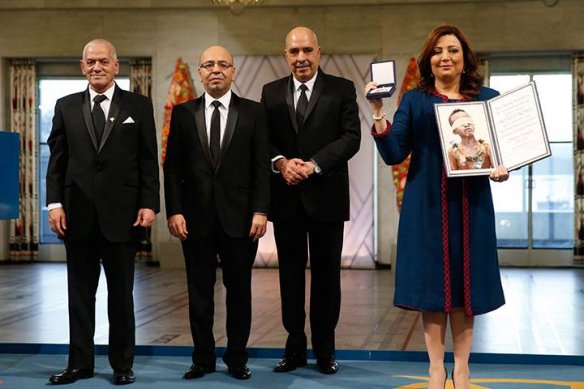
National Dialogue Quartet
Why did Tunisia succeed in reaching a compromise that led to democratic development, while other countries in the region have failed?
The answer does not lie in the large numbers of activists and demonstrators. There were also massive crowds protesting against the regimes in countries such as Egypt and Yemen. Nor is the answer an absence of Islamists. Islamist parties dominated in all the Arab countries.
Following the award of the Peace Prize, politicians and commentators have emphasized that the award shows the importance of “dialogue” and “compromise” in the building of strong democracies. But dialogue alone is insufficient. In Tunisia’s neighbour Egypt there were several attempts at national dialogue. The parties engaged in discussions, but never reached agreement.
